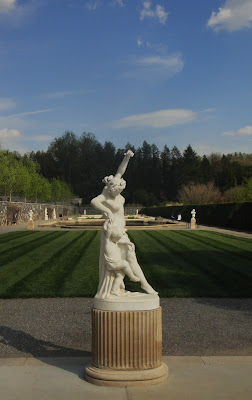I spent last week in a little town called Black Mountain--just outside Asheville, NC--with some of David's friends at their home called Graybeard Abbey. While there, I thought I'd pay a visit to Warren Wilson College--an unusual liberal arts school, as it requires its students to work 15 hours a week on one of many crews (farm crew, forestry crew, plumbing crew, dining services crew, etc.), in addition to spending 100 hours performing community service over four years. (The money the students make from the work is put toward tuition.)
The picture above and pictures below were taken on their 300-acre farm and garden, which is manned by the student body and supervised by professional farmers. Beef, pork and poultry are sold locally and many of the vegetables from the garden wind up in the students' on-campus dining halls.
Naturally, I fell in love with the place. After only a few hours on campus, I can't speak with authority on the effectiveness of their model, but I get the impression that students, at a school like this, would be way better off if their educations provided them with practical training in addition to the more theoretical and just-as-valuable liberal arts curriculum.
A friend of a friend (who's now a friend), who used to work at the Biltmore Estate, got me onto the premises for free (which would have otherwise cost me $60).
Quick history of the place: The Estate, at 175,000 square feet (the largest private home in America), was built in the 1890's by George Washington Vanderbilt, a railroad tycoon. Now, it's a tourist destination, employing somewhere around 2,000 locals, according to my host.
My main impression: What's the point? One does not build something like this for our mortal lives; it is built, like the Pyramids, for the ages.
There is something unsettling about the owners' vision. It is big and huge and eleborate, but there is a hollowness to the place. Vanderbilt must have had his legacy in mind. Yet is this what he envisioned: a bunch of polo-shirted upper-middle-class tourists feeling elegant tasting wine, and wasting money on stuffed animals, ornate china, and Christmas ornaments at gaudy novelty shops?
What are we looking at? This isn't a monument that was built to speak to the gods or ascend to the heavens; it was built by the opulent for the sake of opulence; it was a mere mud pile of money for the wealthy to roll in like hogs.
I suppose, though, there is a silver lining. It provides jobs. A lot of the acreage was sold off to form a good deal of the current Pisgah National Forest, and the Vanderbilts were philanthropic. And I suppose--despite the ridiculousness of the place--that such grandeur can be appetizing to our baser sensibilities.
































